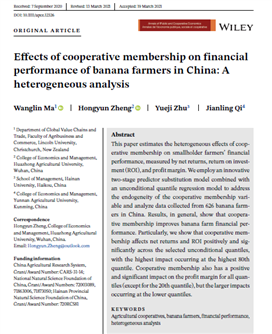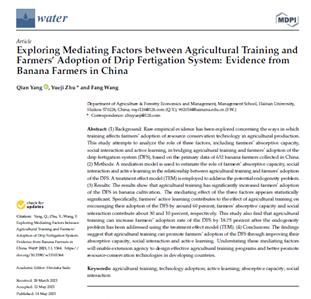近期,国家香蕉产业技术体系产业经济岗位论文《Exploring mediating factors between agricultural training and farmers’ adoption of drip fertigation system: Evidence from banana farmers in China》和《Effects of cooperative membership on financial performance of banana farmers in China: A heterogeneous analysis》分别被国际SCI学术期刊《Water》(JCR二区/SCI二区,IF=2.544)和国际SSCI学术期刊《Annals of Public and Cooperative Economics》(IF=1.271)录用发表。
《Effects of cooperative membership on financial performance of banana farmers in China: A heterogeneous analysis》一文由岗位顾问新西兰林肯大学马旺林博士、团队成员朱月季等共同完成,该研究主要探讨合作社成员资格对中国香蕉农户财务绩效的影响,并分析不同水平上合作社成员资格对农户财务绩效的影响。研究表明,平均而言,合作社成员资格可以显著提高香蕉农户的财务绩效且对较低分位数上的农户提升效果更明显。
《Exploring mediating factors between agricultural training and farmers’ adoption of drip fertigation system: Evidence from banana farmers in China》一文由杨倩、朱月季、王芳共同完成,该研究主要探究如何能够更好开展农业培训,促进香蕉农户采用资源节约型农业技术。
以上研究工作均得到了财政部和农业农村部立项的国家现代农业产业技术体系资助。
附:论文详情

Effects of cooperative membership on financial performance of banana farmers in China: A heterogeneous analysis
作者:马旺林,郑宏运,朱月季,起建凌
题目:合作社成员资格对中国香蕉种植户财务绩效的影响:一个异质性分析
摘要:本文用净收益、投资回报率(ROI)和利润率来衡量合作成员资格对小农财务绩效的异质性影响。本研究采用一个新的两阶段预测替代模型结合无条件分位数回归模型来解决合作成员变量的内生性问题,并对626个中国香蕉农户的数据进行分析。研究结果表明,合作成员可以提高香蕉生产的财务绩效。特别是,本研究表明合作成员在选定的无条件分位数上对净收益和ROI产生正向显著的影响,最大的影响发生在最高的第80分位数。总体而言,结果表明合作社成员可以改善香蕉生产的财务绩效。合作社成员还对所有分位数(第20个分位数除外)的利润率产生积极且显著的影响,但对较低分位数的影响更大。
全文链接: https://onlinelibrary.wiley.com/doi/10.1111/apce.12326
Ma, Wanglin, Zheng, Hongyun, Zhu, Yueji, and Qi, Jianlin.(2021). Effects of cooperative membership on financial performance of banana farmers in China : A heterogeneous analysis. Annals of Public and Cooperative Economics.1–23.
Abstract:
This paper estimates the heterogeneous effects of cooperative membership on smallholder farmers’ financial performance, measured by net returns, return on investment (ROI), and profit margin. We employ an innovative two-stage predictor substitution model combined with an unconditional quantile regression model to address the endogeneity of the cooperative membership variable and analyze data collected from 626 banana farmers in China. Results, in general, show that cooperative membership improves banana farm financial performance. Particularly, we show that cooperative membership affects net returns and ROI positively and significantly across the selected unconditional quantiles, with the highest impact occurring at the highest 80th quantile. Cooperative membership also has a positive and significant impact on the profit margin for all quantiles (except for the 20th quantile), but the larger impacts occurring at the lower quantiles.

Exploring mediating factors between agricultural training and farmers’ adoption of drip fertigation system: Evidence from banana farmers in China
作者:杨倩,朱月季,王芳
题目:探析农业培训与农户采纳水肥一体化技术的中介因素——来自中国香蕉农户的证据
摘要: (1)背景:培训如何影响农户在农业生产中采用资源节约型技术的实证证据较少。本研究以中国632名香蕉农户为研究对象,分析了农户的吸收能力、社会互动和主动学习三个因素在农业培训与他们采纳水肥一体化技术(DFS)中的作用。(2)方法:采用中介效应模型测算农民的吸收能力、社会互动和主动学习在农业培训与农民采纳DFS之间的关系。采用处理效应模型(TEM)来解决潜在的内生性问题。(3)结果:香蕉种植中农业培训显著提高了农户对DFS的采纳,且三个因素的中介作用具有统计学意义。具体来说,主动学习在农业培训促进农户采纳DFS方面产生了约60%的促进效果;而农户的吸收能力和社会互动分别贡献了30%和10%的促进效果。本研究还发现,在使用处理效果模型(TEM)解决了内生性问题之后,农业培训可以使农户对DFS的采纳率提高18.75%。(4)结论:农业培训可以通过提高农户的吸收能力、社会互动和主动学习来促进其采纳DFS。了解这些中介因素将使推广机构能够设计有效的农业培训项目,并更好地在发展中国家推广资源节约型技术。
全文链接: https://www.mdpi.com/2073-4441/13/10/1364
Yang, Qian, Zhu, Yueji, and Wang, Fang. (2021). Exploring mediating factors between agricultural training and farmers’ adoption of drip fertigation system: Evidence from banana farmers in China. Water.
Abstract:
(1) Background: Rare empirical evidence has been explored concerning the ways in which training affects farmers’ adoption of resource conservation technology in agricultural production. This study attempts to analyze the role of three factors, including farmers’ absorptive capacity, social interaction and active learning, in bridging agricultural training and farmers’ adoption of the drip fertigation system (DFS), based on the primary data of 632 banana farmers collected in China. (2) Methods: A mediation model is used to estimate the role of farmers’ absorptive capacity, social interaction and active learning in the relationship between agricultural training and farmers’ adoption of the DFS. A treatment effect model (TEM) is employed to address the potential endogeneity problem. (3) Results: The results show that agricultural training has significantly increased farmers’ adoption of the DFS in banana cultivation. The mediating effect of the three factors appears statistically significant. Specifically, farmers’ active learning contributes to the effect of agricultural training on encouraging their adoption of the DFS by around 60 percent; farmers’ absorptive capacity and social interaction contribute about 30 and 10 percent, respectively. This study also find that agricultural training can increase farmers’ adoption rate of the DFS by 18.75 percent after the endogeneity problem has been addressed using the treatment effect model (TEM). (4) Conclusions: The findings suggest that agricultural training can promote farmers’ adoption of the DFS through improving their absorptive capacity, social interaction and active learning. Understanding these mediating factors will enable extension agency to design effective agricultural training programs and better promote resource-conservation technologies in developing countries.
内容编辑:
 地址:海南省海口市城西学院路4号(571101)
地址:海南省海口市城西学院路4号(571101) 电话:0898-66986419 传真:0898-66986419
电话:0898-66986419 传真:0898-66986419  E-mail:china_banana2008@vip.163.com
E-mail:china_banana2008@vip.163.com